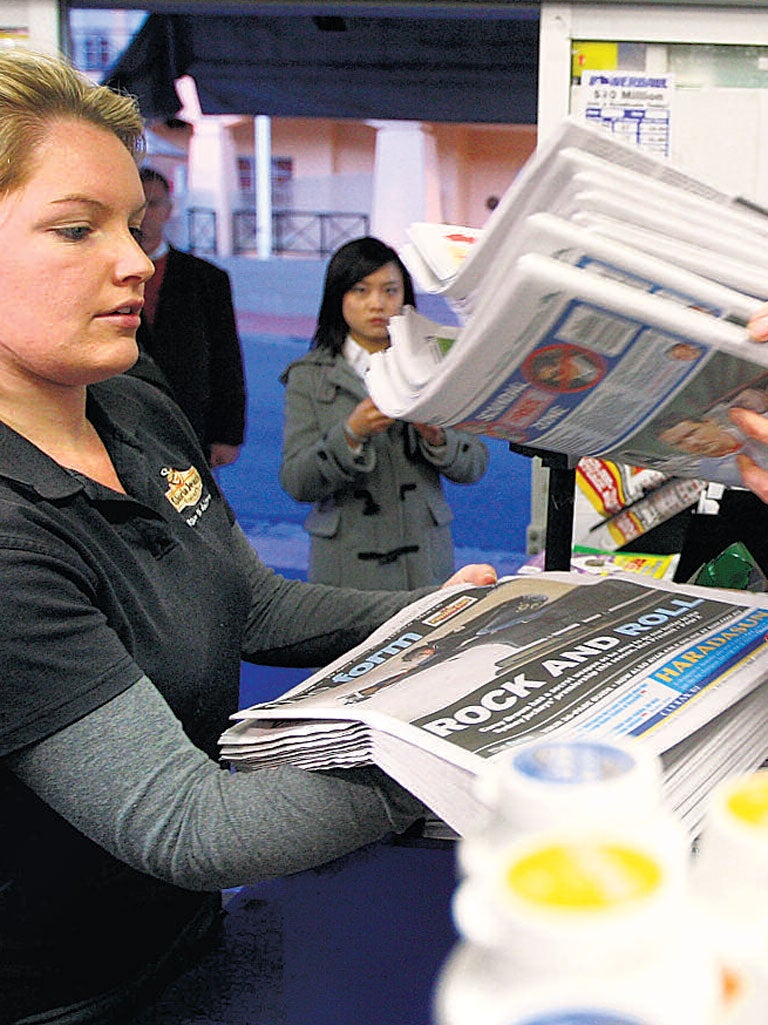Papers may be evil, but better the devil you know
Kelner's View


Your support helps us to tell the story
From reproductive rights to climate change to Big Tech, The Independent is on the ground when the story is developing. Whether it's investigating the financials of Elon Musk's pro-Trump PAC or producing our latest documentary, 'The A Word', which shines a light on the American women fighting for reproductive rights, we know how important it is to parse out the facts from the messaging.
At such a critical moment in US history, we need reporters on the ground. Your donation allows us to keep sending journalists to speak to both sides of the story.
The Independent is trusted by Americans across the entire political spectrum. And unlike many other quality news outlets, we choose not to lock Americans out of our reporting and analysis with paywalls. We believe quality journalism should be available to everyone, paid for by those who can afford it.
Your support makes all the difference.There was a very small earthquake in the world of newspapers yesterday and certainly not many died as a result.
Two daily papers in towns in Australia were closed down in what has been reported as the first systematic closure of paid-for titles Down Under. To which I can hear your reaction: why on earth should we care? True, set against the more pressing issues we all face today – from job insecurity to global warming – it doesn't really register on our personal Richter Scale of concerns. And while we in the industry may, in some small part, mourn the passing of the Coffs Coast Advocate and the Tweed Daily News, I am not really advocating (if you'll forgive the pun) that you should spend too much time worrying about the shortfall in information that's about to hit the citizens of New South Wales.
However, this story is relevant as it has important parallels with what is happening much closer to home. The demise of the local paper in Britain is something we should all take seriously. There is no central register of closures, but titles such as the Belper Bugle, the Spalding Target, the Abergele Visitor and the Westmorland Messenger have been among the dozens to have disappeared in the past few years and a respected media analyst told a committee of MPs that up to half of the UK's local papers could close by 2014. The loss of a local paper may not have the day-to-day impact on a community of, say, the closure of a butcher's shop or a hardware store, but the gap it leaves behind is a very serious one.
The need for printed media may be waning, replaced in part by the many other, freely available sources of information. But the need for independent news is as great as ever and the desire to hold local politicians to account and businesses to scrutiny, is arguably more intense in this age of supposedly open government and commercial transparency.
Up and down the country, there are a few public-spirited individuals who are doing their bit, through websites, blogs, newsletters and the like, to make up this democratic deficit. In many areas, however, there is a great big vacuum where reporting on local councils used to be, hence the poor turn-out in regional elections. In the worst of all worlds, this shortfall is taken up by the council itself with the sort of publication that would give Pravda a run for its money in terms of objective reporting.
I live in the borough of Kensington and Chelsea and part of my council tax goes to the publication of a free "newspaper" called Royal Borough, which is little more than council propaganda. Cutbacks are referred to as "shared services", and stories tell of the council's "good planning" and of schools delivering "a first-class education".
One thing is for sure, from Coffs Coast to Kensington: journalism may have a bad reputation at the moment, but we'll miss it if it's not there.
Join our commenting forum
Join thought-provoking conversations, follow other Independent readers and see their replies
Comments